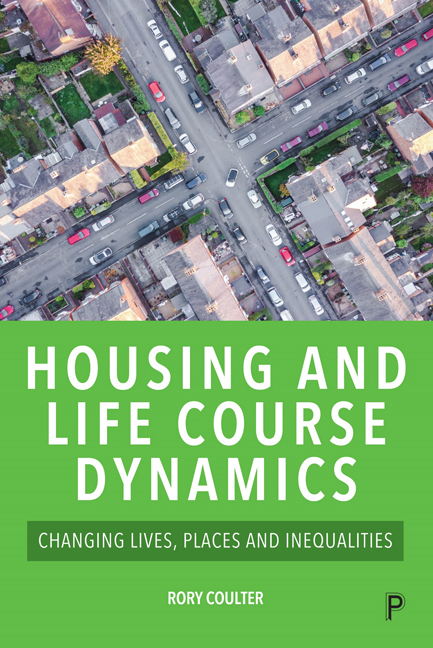Book contents
- Frontmatter
- Dedication
- Contents
- List of figures and tables
- List of abbreviations
- Notes on the author
- Acknowledgements
- Preface
- 1 Introduction
- 2 Housing: a life course perspective
- 3 Households and families
- 4 Learning and training
- 5 Employment and money
- 6 Health, well-being and care
- 7 Changing places
- 8 Understanding housing and life course dynamics
- Notes
- References
- Index
5 - Employment and money
Published online by Cambridge University Press: 18 January 2024
- Frontmatter
- Dedication
- Contents
- List of figures and tables
- List of abbreviations
- Notes on the author
- Acknowledgements
- Preface
- 1 Introduction
- 2 Housing: a life course perspective
- 3 Households and families
- 4 Learning and training
- 5 Employment and money
- 6 Health, well-being and care
- 7 Changing places
- 8 Understanding housing and life course dynamics
- Notes
- References
- Index
Summary
As the GFC illustrated, it is difficult to overstate just how integral housing is to 21st-century economies and to the global financial system. Yet to fully understand how housing matters for economic prosperity and inequalities, we must look behind the national statistics at the ways in which housing careers are bound up with the labour market position and financial well-being of individuals and families over the life span.
This chapter uses the life course perspective to take a fresh look at how the deep interactions between housing and labour market careers influence economic outcomes at both the micro- and macro-levels. It shows how the ways people engage with both the labour market and the housing system over the course of their lives play a crucial role in determining the social distribution of resources. The chapter begins by using Chapter 2's life course conceptual toolbox to review how employment influences housing behaviour and housing system dynamics. It then inverts the focus to consider the role housing resources, opportunities and constraints play in shaping employment careers and the broader operation of labour markets. Finally, the chapter examines how differential accumulation and use of housing wealth influences contemporary patterns of social and spatial inequality.
Labour markets and residential behaviour
In Why Families Move, Rossi (1955) argued that housing transitions are adjustments undertaken to satisfy the new residential demands which emerge as people pass through the family life cycle. However, scholars quickly recognised that Rossi's demographically driven model said too little about labour force participation and in particular how a desire to improve one’s economic position or social status can be a powerful motive for residential adjustments (De Jong and Fawcett, 1981). Moreover, the housing choice set available to people and thus their ability to act on their residential preferences is stratified by employment status, class and income (Kendig, 1984). Early housing career models often downplayed these factors by simplistically assuming that occupational careers generally progress upwards over the life span as age brings promotions, higher wages and accumulated savings.
Since the 1970s, economic restructuring across the Global North under what has been variously termed the transition to post-Fordism, advanced capitalism or post-industrialism have shattered this optimistic assumption of occupational progression over the life span.
- Type
- Chapter
- Information
- Housing and Life Course DynamicsChanging Lives, Places and Inequalities, pp. 97 - 122Publisher: Bristol University PressPrint publication year: 2023

